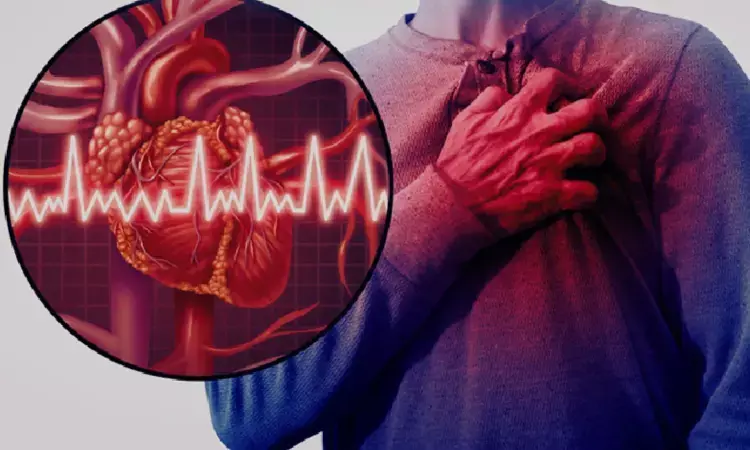- Home
- Medical news & Guidelines
- Anesthesiology
- Cardiology and CTVS
- Critical Care
- Dentistry
- Dermatology
- Diabetes and Endocrinology
- ENT
- Gastroenterology
- Medicine
- Nephrology
- Neurology
- Obstretics-Gynaecology
- Oncology
- Ophthalmology
- Orthopaedics
- Pediatrics-Neonatology
- Psychiatry
- Pulmonology
- Radiology
- Surgery
- Urology
- Laboratory Medicine
- Diet
- Nursing
- Paramedical
- Physiotherapy
- Health news
- Fact Check
- Bone Health Fact Check
- Brain Health Fact Check
- Cancer Related Fact Check
- Child Care Fact Check
- Dental and oral health fact check
- Diabetes and metabolic health fact check
- Diet and Nutrition Fact Check
- Eye and ENT Care Fact Check
- Fitness fact check
- Gut health fact check
- Heart health fact check
- Kidney health fact check
- Medical education fact check
- Men's health fact check
- Respiratory fact check
- Skin and hair care fact check
- Vaccine and Immunization fact check
- Women's health fact check
- AYUSH
- State News
- Andaman and Nicobar Islands
- Andhra Pradesh
- Arunachal Pradesh
- Assam
- Bihar
- Chandigarh
- Chattisgarh
- Dadra and Nagar Haveli
- Daman and Diu
- Delhi
- Goa
- Gujarat
- Haryana
- Himachal Pradesh
- Jammu & Kashmir
- Jharkhand
- Karnataka
- Kerala
- Ladakh
- Lakshadweep
- Madhya Pradesh
- Maharashtra
- Manipur
- Meghalaya
- Mizoram
- Nagaland
- Odisha
- Puducherry
- Punjab
- Rajasthan
- Sikkim
- Tamil Nadu
- Telangana
- Tripura
- Uttar Pradesh
- Uttrakhand
- West Bengal
- Medical Education
- Industry
Routine colchicine administration after acute myocardial infarction may not improve outcomes, highlights study

The largest trial to examine the impact of colchicine in acute myocardial infarction (MI) found that both acute and long-term colchicine use did not reduce cardiovascular death, myocardial infarction, stroke, or ischemia-driven revascularization.
Findings were reported today at TCT 2024, the annual scientific symposium of the Cardiovascular Research Foundation (CRF). TCT is the world’s premier educational meeting specializing in interventional cardiovascular medicine.
Inflammation may play an important role in acute coronary syndromes and coronary artery disease. Colchicine is an oral medication that reduces inflammation and smaller studies have indicated potential benefits for cardiovascular patients. With a placebo-controlled factorial design, CLEAR SYNERGY (OASIS 9) is the largest trial of colchicine in patients with acute MI.
A total of 7,062 participants were randomized at 104 sites in 14 countries between February 2018 and November 2022. Patients were eligible if they had ST elevation myocardial infarction (STEMI) or large non-ST elevation myocardial infarction (NSTEMI). Study subjects were randomized within 72 hours of PCI to either colchicine or placebo. Both groups were then randomized again to receive spironolactone or placebo. Patient characteristics were similar between both groups. The mean age was 60.6 years, 18% had diabetes and 9% had prior MI.
The trial was designed with 80% power to detect a 25% relative risk reduction in the primary outcome (9% estimated control event rate) as assessed using a Cox proportional hazards model, stratified by STEMI versus NSTEMI and spironolactone versus placebo.
At a median follow-up of three years, the composite of cardiovascular death, recurrent MI, stroke, or ischemia driven revascularization was not significantly different between the colchicine and placebo groups [9.1 vs. 9.3%, HR 0.99, 95% CI (0.85-1.16), p=0.93]. In addition, there were no significant differences in any of the individual components of the composite endpoint. A significant reduction in C-reactive protein (CRP), a marker for inflammation, was observed with colchicine therapy, however. Adverse events were similar between both study cohorts except that diarrhea was more common after colchicine than with placebo (10.2% vs. 6.6%, p<0.001).
“We designed this trial to provide reliable evidence of the effect of routine colchicine in acute myocardial infarction on clinically important outcomes,” said Sanjit S. Jolly, MD, MSc, principal investigator of the study and scientist at the Population Health Research Institute (PHRI), a joint institute of McMaster University and Hamilton Health Sciences, Canada. “As the largest trial to date on this subject (649 outcome events), with significantly more events than previous studies, colchicine did not provide a significant benefit and its role in long-term post myocardial infarction use is uncertain.”
Reference:
Routine colchicine administration after acute myocardial infarction does not improve outcomes, Cardiovascular Research Foundation, Meeting: TCT 2024: Transcatheter Cardiovascular Therapeutics.
Dr Kamal Kant Kohli-MBBS, DTCD- a chest specialist with more than 30 years of practice and a flair for writing clinical articles, Dr Kamal Kant Kohli joined Medical Dialogues as a Chief Editor of Medical News. Besides writing articles, as an editor, he proofreads and verifies all the medical content published on Medical Dialogues including those coming from journals, studies,medical conferences,guidelines etc. Email: drkohli@medicaldialogues.in. Contact no. 011-43720751


